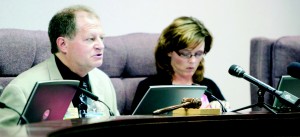 On Oct. 21, the Francis Howell Board of Education voted 4-1-2 to approve the calendar task force’s recommendation to amend the calendar system of the district for the 2011-2012 school year. Out of this decision, many changes will come for the upcoming school year, including major changes to breaks. One of the most significant and controversial changes is that of the year round schedule which elementary schools have worked around since 1969. Next year, that 41-year streak ends.
On Oct. 21, the Francis Howell Board of Education voted 4-1-2 to approve the calendar task force’s recommendation to amend the calendar system of the district for the 2011-2012 school year. Out of this decision, many changes will come for the upcoming school year, including major changes to breaks. One of the most significant and controversial changes is that of the year round schedule which elementary schools have worked around since 1969. Next year, that 41-year streak ends.
The Board has worked with community leaders and task force representatives for three months to reach their decision, which culminated in a public forum to discuss the proposal on Oct. 21. Many teachers and patrons were present at the meeting, voicing opinions across spectrum of support. Libbie Kapland, a third grade teacher at Warren Elementary, spoke on behalf of the opposition, citing the natural “burning-out” and rejuvenation process that cycle breaks help to combat as a reason to keep the year round schedule where it is at.
“It makes sense for kids,” Kapland said. “They work hard for nine weeks then get time to recuperate. It gives kids time to relax.”
The disintegration of the year round schedule is just one of many changes that the task force has built into the calendar to help save the district money. Where as the 2010-2011 had 13 half days on the secondary level and 12 on the elementary level, the new calendar consolidates those to just four for all three levels. In addition, the number of student instruction days has been decreased from 174 to 169, due to a change in State attendance requirements- a change that will save the District $232,000. The breaks are also undergoing major changes. Fall break is having three days added to it, and spring break is having another week addition. Such a change has been seen in different light by different people. Angela Lawson, a mother of two district students, has found that the fiscal state of the District holds more baring to the matter than the alternatives.
“It’s not the days that the students are in school that makes our district unique,” Lawson said. “But rather the people.”
However, Kapland as well as other teachers are concerned that less days with the students in the classrooms will have a negative effect on student progress.
“As a teacher I have some concerns with the calendar,” Kapland said. “Five less days to implement our curriculum is a push.”
But the savings to be made have taken the center stage on the issue. In 2003, the District found itself in a similar financial position. At that time, a task force was created to explore the option of eliminating the year round system. It was recommended by that committee the Year Round remain in affect, having no negative nor positive effect on student achievement, unless the District would be forced to cut staff and programs. According to the current task force, it is estimated that nearly 25 teaching positions would need to be eliminated to recover the cost that amending the calendar system will accomplish, a factor that weighed heavily on Board of Education Treasurer Mike Hoehn.
“We no longer have the resources,” Hoehn said. “Other students in the area do fine on the traditional calendar.”
In spite of the changes, the new calendar has received an overwhelming amount of support both from the community and the District staff. A survey conducted by the task force reveals that roughly 73 percent of parents are either satisfied or neutral towards the change. And it has already been received well by North administration.
“I’m glad it passed. I wanted to save teachers,” North Principal Darlene Jones said. “That’s the bottom line.”
By Kevin Beerman










